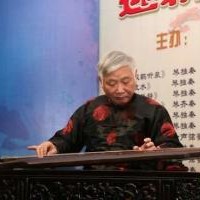Liu Zhengchun
Organized by 左树 on 2022-02-09

Liu Zhengchun (March 10, 1935 - June 1, 2013) is a representative of the modern Jinling School. In 2009, he was named the intangible cultural heritage - the national successor of the Jinling School of Guqin.
When Mr. Liu Zhengchun was fifteen years old, he studied the qin under the tutelage of Zhou Kongming of the Fanchuan School, and later learned from the qin masters of the Zhucheng School, Wang Shengxiang, Xia Yifeng of the Jinling School, Liu Shaochun of the Guangling School, Cheng Wujia of the Mei'an School, and Zhao Yunqing of the Jinling School. The style of the piano is based on the Jinling School, and does not take the advantages of other families, forming an artistic style of elegant, vigorous and simple, and rhyme and sound.
On November 7, 2003, the art of guqin was selected into the second batch of "Masterpieces of the Oral and Intangible Heritage of Humanity" by UNESCO. He is listed as one of the fifty-two inheritors who have been confirmed in the "Guqin Art Declaration", a reference model for the declaration of representative works of human oral and intangible heritage provided by the Chinese Academy of Arts.
In 2009, Mr. Liu Zhengchun was rated as the representative inheritor of national intangible cultural heritage (Guqin and Jinling Qin School).
Mr. Liu Zhengchun insisted on teaching the guqin voluntarily all his life, cultivated more than 1,000 piano students at home and abroad, and made positive contributions to the dissemination and promotion of the art of guqin.
His main works include "Exploring the Origin of Qin Music", "Fifty Years of Jinling Qin Forum", "Wang Shengxiang's Guqin Artistic Career", "Qin Trivia", "Er Qin Wu Qin Score" and other works on Qin studies.
Similar artist
Ni Shiyun, a native of Haimen District, Nantong City, Jiangsu Province, China's famous contemporary qin mojo, the fourth generation inheritor of the Mei 'an Qin School, the representative inheritor of the intangible cultural heritage of Jiangsu Province "Guqin art" (Mei 'an Qin school), serves as the director of the Chinese Kunqu Opera Guqin Research Institute and the executive director of the Chinese Qin Association.
read >>
Yang Qiong, the word Yu Rong, Yushan Qin school successor, South Yuqin Club president, operation aman for more than ten years, good at qin songs. He is currently the vice president of Shenzhen Guqin Association, member of Shenzhen Ethnic Orchestral Association, lecturer of Shenzhen University School of Continuing Education and so on.
read >>
Yang Zhijian, Guqin maker and performer. Born in Shanghai in July 1974. National first-class performer; representative inheritor of Shanghai intangible cultural heritage "Guqin-making skills"; vice-chairman of Shanghai Intangible Cultural Heritage Protection Association. Winner of "Shanghai Craftsman" and "May 1st Labor Medal" in 2017.
read >>
Huang Deyuan, inheritor of the intangible cultural heritage "Zhejiang style guqin" and "Wenzhou dialect recitation".
read >>
Involving musical instruments
Guqin (pinyin: Gǔ Qín) is a traditional Chinese musical instrument with a history of at least 3,500 years. Guqin is also known as Yaoqin, Yuqin and Seven-stringed Qin. The guqin has 13 emblems that mark the rhythm, and is also a ritual and musical instrument. It belongs to the silk in the octave. Guqin has a wide range, deep timbre and long aftertone.
Involved portfolio
某某 - 35 views
不知桃夏 - 21 views
沈梦溪 - 25 views
八日蝉 - 29 views
蕾伊 - 28 views
Involved news
Organized by 烟雨燕双飞 on 2025-01-08
With the advent of cold winter, the sudden drop in temperature and the change in air humidity have put special requirements on the maintenance of delicate traditional Musical Instruments such as guqin. As the treasure of Chinese traditional culture and art, Guqin is deeply loved by literati for its beautiful timbres and long charm. In order to ensure that you can also maintain your best condition in winter, so that the elegant rhyme that has spread for thousands of years continues to reverberate in the winter, here are some important maintenance tips.
read >>
Organized by 愛 on 2024-11-14
In the long river of ancient Chinese music, "Spring Xiao Yin" is a very representative ancient qin music. With its melodious melody, delicate emotional expression and profound cultural connotation, this piece has become a classic in the hearts of countless guqin lovers.
read >>
Organized by F.JCLOVE on 2024-11-11
In the long river of ancient Chinese music, Guqin occupies a place with its unique charm. Guqin is not only a musical instrument, but also a cultural symbol, carrying the profound cultural heritage and philosophical thinking of the Chinese nation. As one of the treasures in Guqin repertoire, the story behind it and the music itself are full of strong historical charm and humanistic feelings.
read >>
Organized by 亦寒 on 2024-09-08
"Long Qing" is one of the traditional Chinese guqin repertoire, which is famous for its melodious melody and far-reaching artistic conception. It is not only a piece of music, but also a reflection of ancient Chinese culture and philosophy.
read >>
Organized by 凉凉月色 on 2024-09-07
In the history of Chinese ancient music, "Jieshi Tune · Youlan" is an important ancient music. This piece of music not only attracts attention for its distant historical background, but also is highly respected for its unique artistic charm and profound cultural connotation.
read >>
Popular artists
- 01 Zhang Xiuyan
- 02 Liu Qingyao
- 03 Zhong Xiaotian
- 04 Jiang Ying
- 05 Li Xianyue cherish
 渝公网安备 50010702504639号
渝公网安备 50010702504639号